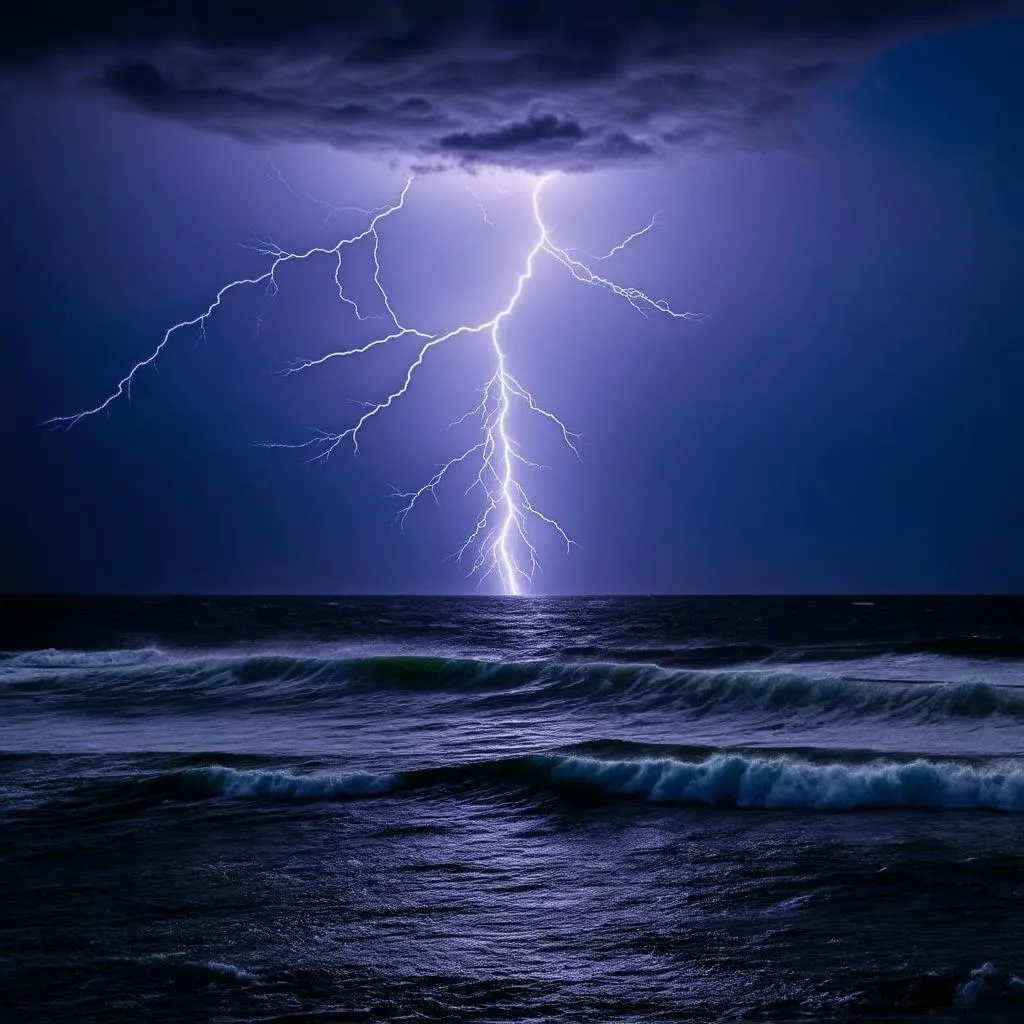Have you ever been swimming in the ocean and a storm suddenly rolled in? You might have wondered about the dangers of lightning, especially its reach in water. It’s a question that has intrigued both scientists and beachgoers alike. While the vastness of the ocean can seem intimidating during a thunderstorm, understanding how lightning behaves in water can alleviate some fears and promote safe practices. So, how far does lightning really travel in water? Let’s dive in and find out!
Understanding Lightning’s Behavior
Before we answer the main question, it’s important to understand how lightning works. Lightning is a powerful electrostatic discharge caused by imbalances between storm clouds and the ground, or even within the clouds themselves. When the electrical potential difference becomes too great, it overwhelms the insulating capacity of the air, resulting in a sudden release of energy – that’s the lightning strike we see.
 Lightning Strike Over Ocean
Lightning Strike Over Ocean
Lightning and Water: A Conductive Relationship
Water is an excellent conductor of electricity, but here’s the catch – it’s the impurities in water, like salts and minerals, that actually do the conducting. Pure water, like distilled water, is a poor conductor.
When lightning strikes the ocean, the electrical current doesn’t travel in a straight line. Instead, it spreads out horizontally along the water’s surface. Think of it like ripples in a pond after you throw a stone. This is why it’s dangerous to be in a boat or swimming during a lightning storm, even if the strike seems far away.
So, How Far Does it Go?
It’s difficult to put an exact distance on how far lightning travels in water. Some experts suggest the electrical current can dissipate significantly within a radius of about 30-50 feet from the point of impact. However, there’s no guarantee of absolute safety within this range.
Factors Affecting Lightning’s Reach
Several factors influence how far lightning’s effects can be felt in water:
- Strength of the strike: More powerful strikes will naturally have a wider reach.
- Depth of the water: The deeper the water, the more the electrical current can dissipate.
- Salinity of the water: Saltwater, with its higher conductivity, will spread the current more than freshwater.
Staying Safe During Thunderstorms Near Water
- Get out of the water immediately: This includes swimming pools, lakes, and the ocean.
- Seek shelter: Find a grounded building or hard-top vehicle.
- Stay away from windows: Even inside, stay away from windows to avoid the risk of shattered glass.
- Wait it out: Don’t resume outdoor activities until at least 30 minutes after the last clap of thunder.
Feng Shui and Water Elements
In Feng Shui, water is associated with wealth and prosperity. However, the powerful energy of a lightning storm disrupts the natural balance. It reminds us to respect the forces of nature and prioritize safety above all else.
FAQs about Lightning and Water
- Can lightning strike you in the shower? While unlikely, it’s possible if there are metal pipes that conduct electricity from a nearby strike.
- Is it safe to swim in a lake after a lightning storm? It’s best to wait at least 30 minutes after the last clap of thunder to ensure the storm has completely passed.
 Family Watching Sunset on Beach
Family Watching Sunset on Beach
Discover More Travel Tips with Travelcar.edu.vn
Planning your next adventure? Check out TRAVELCAR.edu.vn for more informative articles and travel tips. From understanding the science behind “does sound or light travel faster” to learning “how do sound waves travel through air,” we’ve got you covered.
Conclusion
While the exact distance lightning travels in water is variable, it’s crucial to remember that any water activity during a thunderstorm poses a significant risk. By understanding the nature of lightning and following safety precautions, we can enjoy our time near water responsibly and minimize the dangers associated with these powerful natural events.

